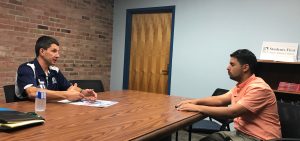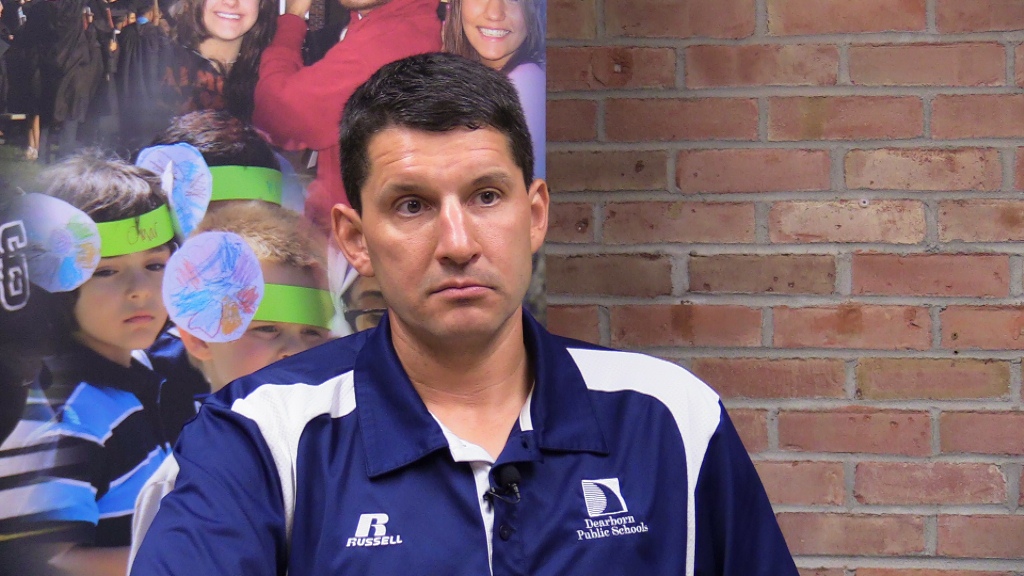Dearborn Superintendent Dr. Maleyko: Schools continue to grow; we have a proactive approach to drug abuse
By: Adel Mozip & Stephen Young
On a hot summer day, Dearborn Public Schools Superintendent Dr. Maleyko sat down with Yemeni American News Publisher Rasheed Alnozili and education correspondent Adel Mozip to discuss current events and issues involving the Dearborn Public Schools district. Dr. Maleyko welcomed the Yemeni American News team in his office conference room and sat down for 40-minute interview that will be published in video on our website and Facebook page.
The Yemeni American News prepared many questions for the superintendent ranging from his accomplishments to overcapacity issues to drug usage to the reception of immigrants in the district.

When asked about his accomplishments since taking the position as Superintendent back in 2015, Dr. Maleyko said “I am going into 21st year in the district; first as a teacher at Salina, then principal there and at Duvall, then becoming the Human Resources director for the district and now being the Superintendent.” He mentions some of his accomplishments are changing the structure of the school district into a feeder-model; focusing on K-12 transitions from elementary to middle to high school. Another accomplishment is improving on the district wide educational evaluation with the schools outperforming the national average for student growth. Tracking the student achievement and growth data points has led to instructional success and is a major part of the feeder-model he created. Another accomplishment Dr. Maleyko prides himself on having the one of the highest graduation rates Dearborn Public Schools has ever had at 93%.
When asked specifically about student achievement data, and presented with Edsel Ford High School’s turnaround priority school status, Dr. Maleyko said he has seen extensive growth in terms of SAT scores and graduation rates. Dr. Maleyko mentioned the academic performance data in the district continues to grow, and how K-12 teamwork along with outside district support has helped the district improve and get recognized by the State and U.S. News. “The students are not only being recognized for their test scores but also their achievements after high school.” he adds.
Challenges facing the district continue to grow however, as more immigrants and refugees enters the district causing the school system to become overpopulated; currently Dearborn Public Schools has over 21,000 students. In addition, with the fluctuation of power in education at the national level, the district is striving to maximize student growth and academic achievement with limited funds coming from the federal and state levels.
When asked about the existence of data on graduating students, Dr. Maleyko shared the district does track how many students advance to college and vocational programs and estimates the number to be between 60 and 70 percent. The challenge of measuring success using college and vocational program data is how to compare a student going to UM – Ann Arbor or Harvard versus a student going to a community college, a student in a vocational program versus a student who may wait a few years before attending a college or vocational program. The largest issue however is simply ensuring students advance to colleges and vocational programs; the students need skills and tools to succeed.
Dr. Maleyko tells the Yemeni American News that Dearborn Public Schools has worked hard to work with parents in general and making sure the parents understand the strategic plan the district has. “The district has been working on setting up more online access to the learning goals and outcomes. In addition, a program called, “Chatting with the Superintendent”, which functions similar to a town hall meeting, combines school evaluation, teacher feedback, and a dialog with parents on the status of the schools has helped facilitate community involvement.” he adds. According to Dr. Maleyko, the number one issue is assessments and over testing, however the district cannot stop all testing. According to him, all testing protocols, aside from the M-STEP and NWA, have been eliminated district wide as a result of the feedback with parents. In addition to the direct participation in Dearborn Public Schools events, Dr. Maleyko is a member of the Rotary Club, the Dearborn Exchange Club, and the Dearborn Optimist Club; he has made a point to be involved in community functions in order to communicate with parents. Getting more parents involved at Edsel Ford from the feeder schools is something which occurred with great success and hopefully will continue in the near future.
When asked about the possibility of a drug problem, Dr. Maleyko says the Dearborn Police Department data suggests drugs are not as prevalent as some people believe but it is important to be proactive to prevent drug use. “In many cases the drug data from the Dearborn Police may include people who are not students of Dearborn Public Schools, which has potentially skewed the data higher than it actually is. When asked about the issue of groups of students forming to abuse drugs” he says. Dr. Maleyko stated this is a violation of district policy and is being dealt with seriously; although data has not been found to support the students forming groups. He acknowledges that while drug abuse has been increasing across the country, and in the community, a proactive approach and a committee to review the data and establish a drug prevention program is highly needed.
The Yemeni American News contacted Dearborn’s Police Chief Ronald Haddad whom he reported the number of arrests in the city for drug abuse or drug trafficking, as well as the number of deaths from drug overdose. He said in his statement, “there appears to be an 800% increase in drug overdoses nationally over the past three years. During the past 6 months 26 people have died at Dearborn hospitals with the major cause to be overdose of Fentanyl/Heroin-Cocaine. (Note: Not all lived in Dearborn, but were transported here for medical attention.) While we will continue to prosecute individuals for the illicit delivery of dangerous drugs, it will not be enough.”
Cheif Haddad adds that The “War on Drugs” has failed miserably and our society has never been at greater risk. “If there is one thing I have learned over the past 45 years in Law Enforcement, we cannot arrest our way out of this drug epidemic. America is in a drug crisis the will require a holistic effort with schools, medical and mental health professionals, faith based communities, social agencies, political leaders and of course parents. A national call for action with real solutions to include committed local partnerships is essential for effective education, awareness and strategies that will best serve and protect our people.” he adds.
According to the Dearborn City Police, there were 836 drug-related arrests last year (2016), while this year up to September 1st, there were more than 626 arrests were made. Deaths in Dearborn hospitals as a result of drug overdoses are 102 for the past year (2016) compared to this year to date (Sept 1) of 64, while the number of deaths is estimated at 98 in 2015.
The Yemeni American News asked the following question to Dr. Maleyko: Students are coming from war torn countries at a significantly greater rate than in the past, many with issues related to depression, anxiety, and lack documentation of education. How is the district resolving these issues. Dr. Maleyko said “One major challenge is state law prevents crediting students with credits if they do not have documentation of their education record. A possible solution is to have students work towards a GED instead of a high school degree if the student is too old to be in a high school setting.”
The Dearborn Public Schools are trying to address the issue of overpopulation through a committee integrated with the strategic plan. The committee has taken heat from the residents of the city for how it was set up and the lack of listening to parental feedback. When asked about the issue, Dr. Maleyko responded with the district is going to seek the feedback of residents and address the inaccuracies associated with the issue. The pre planning committee has not made any decisions and was set up to develop ideas. The issue does exist and is a good problem to have because the district is expanding rather than collapsing. Dr. Maleyko wanted to stress he greatly stands for community input and while a lot was taken out of context he would like the community to know there will be an opportunity for feedback from the residents of Dearborn. The committee set up to address the overpopulation issue has given the superintendent 3 mandates at this point: eliminate school of choice, study the architectural design of Dearborn High School and see what can be done in terms of expansion, and hire outside consultants to look at population trends before anything is decided. The process of changing school boundaries involves discussions with all of the schools involved, as well as the parents of the children, before anything is decided.
The Arab American community does not feel the district views soccer as a priority and has been curious if the soccer could be expanded into the middle schools. In response, the superintendent said the issue of soccer as a middle school sport was reviewed, however at this time there are no plans to make soccer a middle school sport due to restrictions on the number of seasons allowed for middle school athletics because of budget and coaching constraints. In addition, he focused on the community programs available to children in the community and would be willing to investigate the issue further in the future. Dr. Maleyko wanted to clarify he is a strong advocate of athletics and is very supportive of soccer.
The last question asked to Dr. Maleyko was about working with the Dearborn Public School Board and the fact the people on the Dearborn Public School Board also are on the Henry Ford College Board. The advantages of people serving on both boards is the skillset of people who would normally be on one board helping with the other. As an example, a professor on the Dearborn Public School Board contributes by helping to ensure the district is preparing students for college in the most effective manner. Aside from the advantages noted, Dr. Maleyko does not have an opinion on splitting the Boards into different entities represented by differently elected people.
Some of the goals for the upcoming years include connecting with students and figure out what they would like to see happen. Dr. Maleyko would like to see students attending the Advisory Council and providing input on the strategic plan. He also would like to see the schools continue to improve in growth and proficiency achievement; in addition, he would like to see teachers utilizing data analysis to facilitate the growth and proficiency increases.












